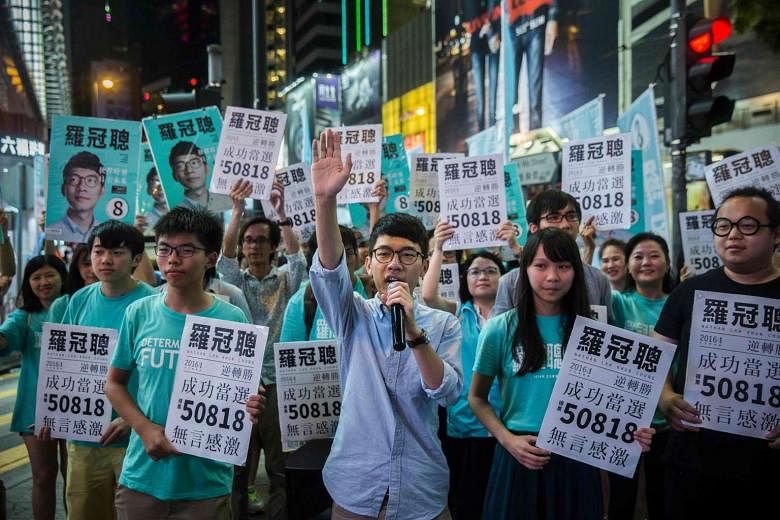HONG KONG (AFP) - Beijing has warned new Hong Kong lawmakers not to back independence for the semi-autonomous city after young anti-China activists won seats for the first time in key weekend elections.
Sunday's (Sept 6) vote saw young activists pushing for more autonomy from Beijing secure a crucial foothold in the city's Legislative Council (LegCo), as fears grow that China is tightening its grip.
It was the first major poll since pro-democracy rallies in 2014 failed to win concessions on political reform from Beijing.
Some student protest leaders were among those winning seats in the landmark vote. Five candidates advocating independence or self-determination for Hong Kong are to sit in the 70-seat assembly.
In a statement late Monday, China said that it would not tolerate any talk of independence "inside or outside" the legislature.
"We firmly oppose any activity relating to Hong Kong independence in any form, inside or outside the Legislative Council, and firmly support the Hong Kong government to impose punishment in accordance with the law," state news agency Xinhua cited a spokesperson of the Hong Kong and Macau Affairs Office of the State Council - China's cabinet - as saying.
It said some candidates had used the election as a platform to "openly promote" independence, adding that went against China's constitution, as well as Hong Kong's own mini-constitution, known as the Basic Law.
"It is also against the fundamental interests of all Hong Kong residents," said the statement, which was posted on the website of the Hong Kong and Macau Affairs Office.
The vote saw the highest turnout since Hong Kong was handed back to China by Britain in 1997 under a "one country, two systems" deal that protected the city's freedoms for 50 years.
Fears that Beijing interference is now threatening those liberties in a range of areas, from politics to education and media, have sparked the birth of the independence movement.
Lawmakers will take up their seats on Oct 1 and will have to swear an oath to uphold the constitution, which describes Hong Kong as part of China.
It is not yet clear what may happen if they go on to advocate independence as an option for Hong Kong in the legislature.
The government has already taken steps to deter the pro-independence camp.
It introduced a controversial new form before the LegCo election which required candidates to verify they understood Hong Kong was an "inalienable part of China". Many refused to sign it.
The government also banned the most strident independence activists from standing, causing widespread outrage.
Hong Kong's unpopular leader Leung Chun Ying, seen by critics as a stooge of Beijing, said Tuesday that all lawmakers must abide by the Basic Law.
However, he added that he wanted to cooperate with all legislators.
"(I) hope we can all work for society together," Leung told reporters.
Anti-establishment parties increased their share of the legislature, taking 30 of 70 seats.
It is almost impossible for them to take a majority as 30 seats are appointed by special interest groups that tend to be pro-Beijing.

